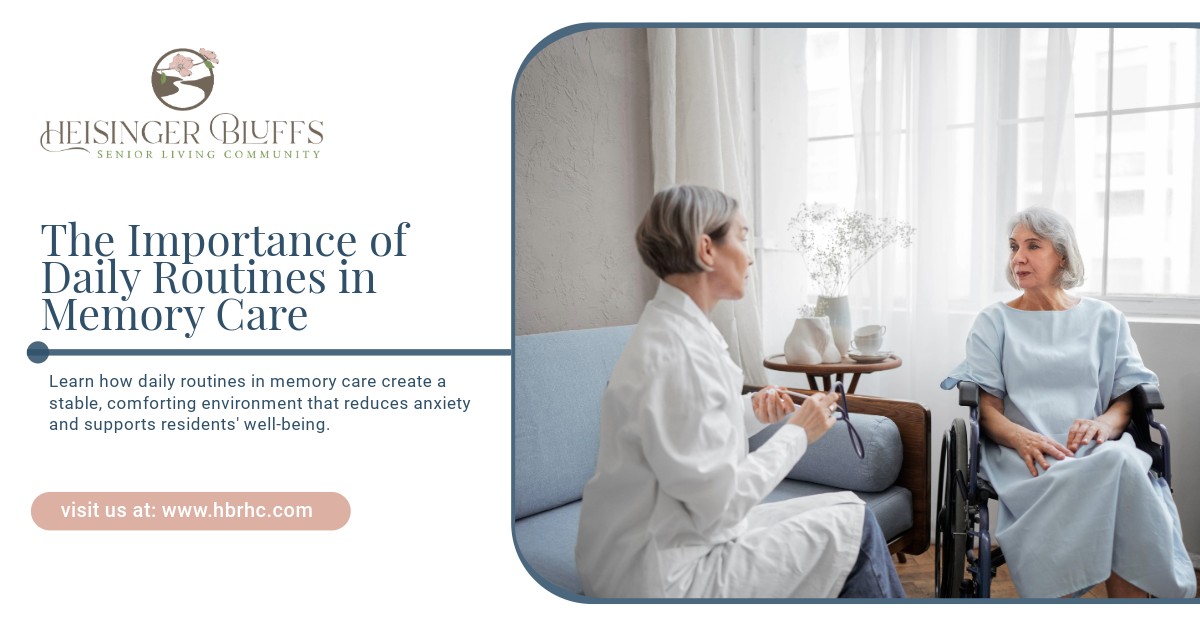The Importance of Daily Routines in Memory Care

Caring for individuals with memory challenges, such as those caused by Alzheimer’s disease or dementia, requires a thoughtful approach to foster stability and emotional well-being. One of the most effective strategies in memory care is the implementation of structured daily routines. These routines create a predictable environment that minimizes confusion and anxiety, offering residents a sense of security while supporting their overall health.
Daily routines are an essential part of memory care because they cater to the unique needs of individuals experiencing cognitive decline. Let’s explore why routines matter, how they benefit memory care residents, and how caregivers and families can incorporate structure to improve the quality of life for their loved ones.
Why Are Daily Routines Essential in Memory Care?
Memory care programs are designed to provide specialized support for individuals experiencing cognitive decline. A key component of these programs is the creation of predictable daily schedules that guide residents through their day with purpose and familiarity.
Routines are essential because:
1. They Reduce Anxiety
Predictable schedules eliminate the uncertainty that can cause confusion and distress. When residents know what to expect, they feel more comfortable and at ease.
2. They Support Cognitive Function
Familiar tasks and activities help stimulate memory recall and reinforce a sense of independence. Engaging in structured activities can also slow cognitive decline by keeping the mind active.
3. They Promote Physical Health
Consistent meal times, exercise routines, and rest periods ensure that residents maintain a healthy lifestyle. Regular activity supports physical well-being and prevents complications from inactivity, such as joint stiffness or muscle loss.
4. They Foster Emotional Stability
Routines provide comfort, security, and a sense of normalcy. Residents feel more in control of their day, which can enhance their mood and overall emotional health.
How Structured Routines Reduce Anxiety
Anxiety is a common challenge for individuals with memory loss. The inability to process new or unexpected situations can lead to feelings of fear or frustration. Structured routines play a critical role in mitigating these issues.
1. Establishing Familiarity
Daily routines center around familiar activities such as waking up, eating meals, exercising, and socializing. This familiarity creates a sense of stability, helping residents feel grounded even if they struggle to recall specific details about their surroundings.
2. Creating Predictability
Predictability is crucial for individuals with memory challenges. Knowing that breakfast is followed by a walk or that mornings are reserved for group activities helps residents transition between tasks with less confusion.
3. Minimizing Overstimulation
Overstimulation from too many changes or unpredictable events can overwhelm residents with cognitive decline. Structured routines prevent overstimulation by maintaining a calm, organized environment.
Key Components of a Memory Care Routine
A well-designed memory care routine addresses physical, cognitive, and emotional needs. It includes activities tailored to the individual’s abilities and preferences, fostering a sense of accomplishment and joy.
1. Morning Routine
Mornings are often structured to promote energy and focus. Activities may include gentle stretching, personal hygiene, and a nutritious breakfast. Morning rituals set the tone for the day and help residents feel refreshed and ready to participate.
2. Engaging Activities
Midday routines often involve activities that stimulate cognitive function and social interaction. Examples include art therapy, music sessions, puzzles, or group exercises. These activities encourage creativity, communication, and memory recall.
3. Mealtime Structure
Regular mealtimes provide nourishment and predictability. Mealtime routines often include familiar foods, calming environments, and support from caregivers, ensuring residents feel comfortable and cared for.
4. Afternoon and Evening Wind-Down
Afternoons may include quiet activities like reading, gardening, or light exercise. Evenings focus on relaxation, with soothing music, calming lighting, and bedtime rituals that prepare residents for restful sleep.
The Role of Caregivers in Supporting Routines
Caregivers play a pivotal role in implementing and maintaining structured routines. Their understanding, patience, and flexibility are essential for ensuring that routines are effective and adaptable to residents' changing needs.
1. Personalizing Routines
Every individual has unique preferences and abilities. Caregivers should tailor routines to reflect residents’ interests and past experiences. For instance, incorporating hobbies like knitting, cooking, or listening to favorite music can make routines more meaningful.
2. Encouraging Participation
Engaging residents in activities that align with their capabilities boosts their confidence and reinforces a sense of independence. Caregivers can offer gentle encouragement and modify tasks to match the resident's comfort level.
3. Monitoring Progress
Regular assessments help caregivers understand how well routines are meeting residents’ needs. Adjustments can be made as necessary to ensure routines remain beneficial and enjoyable.
Benefits of Daily Routines in Memory Care
Implementing daily routines in memory care not only supports residents but also provides peace of mind for their families. Here are the key benefits:
1. Enhanced Quality of Life
Structured days filled with meaningful activities enrich residents’ lives. They experience joy, connection, and purpose, even in the face of cognitive challenges.
2. Improved Behavior Management
Predictable schedules reduce behavioral symptoms such as agitation, aggression, or restlessness, which are common in individuals with memory loss.
3. Strengthened Family Connections
Families feel reassured knowing their loved ones are in an environment that prioritizes their well-being. Routines also provide structure for family visits, helping loved ones engage meaningfully during their time together.
Tips for Families: Creating Routines at Home
While professional memory care programs are highly effective, families can also support loved ones with memory challenges at home. Here are some tips:
- Start Small:
Begin by establishing a simple morning or bedtime routine and gradually add more activities. - Be Consistent:
Maintain a regular schedule for meals, medication, and daily activities. Consistency is key to creating a sense of stability. - Incorporate Familiarity:
Use familiar objects, scents, or sounds to make routines comforting. For example, playing a favorite song during breakfast can evoke positive memories. - Remain Flexible:
While routines are essential, it’s important to remain adaptable. Adjust schedules as needed to accommodate changes in your loved one’s mood or health.
How Memory Care Facilities Support Routines
Memory care facilities are uniquely equipped to create and maintain structured routines that cater to residents’ needs. They provide:
- Specialized Training:
Staff members are trained to support individuals with memory challenges, ensuring routines are followed with care and patience. - Safe Environments:
Facilities are designed with safety in mind, allowing residents to move through their day confidently and securely. - Social Opportunities:
Group activities encourage social interaction, helping residents form connections and reduce feelings of isolation.
Structured Care at Heisinger Bluffs
At Heisinger Bluffs, we understand the transformative power of daily routines in memory care. Our compassionate team works tirelessly to create a stable, enriching environment that prioritizes comfort and emotional well-being. Through personalized care plans, engaging activities, and a strong sense of community, we help residents and their families navigate the challenges of memory loss with confidence and peace of mind.
Frequently Asked Questions
Why are routines important for individuals with memory loss?
Routines create a predictable environment that reduces confusion and anxiety, helping individuals with memory loss feel more secure and in control.
How do routines improve behavior in memory care residents?
Predictable schedules minimize triggers for agitation or restlessness, promoting a calm and positive atmosphere.
Can families replicate memory care routines at home?
Yes, families can establish structured routines by maintaining consistent schedules, incorporating familiar activities, and being patient and flexible with changes.











